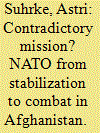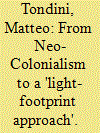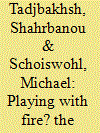|
|
|
Sort Order |
|
|
|
Items / Page
|
|
|
|
|
|
|
| Srl | Item |
| 1 |
ID:
081575


|
|
|
|
|
| Publication |
2008.
|
| Summary/Abstract |
Between 2001 and 2007, the United States and NATO gradually abandoned the commitment to a light military footprint in Afghanistan, initially adopted to avoid making the same mistakes as the Soviet Union. A heavy footprint, it was feared, would enable the militants to mobilize resistance in the name of Islam and Afghan nationalism. As it turned out, the militants mobilized effectively to meet the growing foreign military presence. More combat troops have given NATO some tactical victories, but the limitations and counterproductive effects of the military approach to defeat the militants tend to undermine NATO's broader stabilization function in Afghanistan, thus pointing to a fundamental contradiction in the mission. Strengthening NATO's combat role is likely to sharpen this contradiction and increase the related probability of a strategic failure.
|
|
|
|
|
|
|
|
|
|
|
|
|
|
|
|
| 2 |
ID:
081574


|
|
|
|
|
| Publication |
2008.
|
| Summary/Abstract |
This article focuses on the ways in which Dutch peacekeepers in Bosnia (SFOR8) and Kosovo (KFOR2) in 1999-2000 perceived local populations and host countries. It analyses the tension between military combat socialization and peacekeeping missions through ethnographic fieldwork and by borrowing tools from tourism and expatriate theories. Derived from the 'tourist space' concept, soldiers construct a spurious 'peacekeeping space', which confirms their combat and masculine beliefs that the contrived images which the military establishment has created in the first place are borne out by the reality of the deployment
|
|
|
|
|
|
|
|
|
|
|
|
|
|
|
|
| 3 |
ID:
081576


|
|
|
|
|
| Publication |
2008.
|
| Summary/Abstract |
The article analyses peacebuilding theories and methods, as applied to justice system reform in post-conflict scenarios. In this respect, the international authorities involved in the reconstruction process may traditionally choose between either a dirigiste or a consent-based approach, representing the essential terms of reference of past interventions. However, features common to most reconstruction missions, and relatively poor results, confirm the need for a change in the overall strategy. This requires international donors to focus more on the 'demand for justice' at local levels than on the traditional supply of financial and technical aid for reforms. The article stresses the need for effectively promoting the 'local ownership' of the reform process, without this expression being merely used by international actors as a political umbrella under which to protect themselves from potential failures
|
|
|
|
|
|
|
|
|
|
|
|
|
|
|
|
| 4 |
ID:
081573


|
|
|
|
|
| Publication |
2008.
|
| Summary/Abstract |
A critical examination of the effort to build a liberal peace since 1999 in East Timor illustrates that to a large degree the liberal peace model has failed the East Timorese people. There are two aspects to this: the first is the failure to construct a social contract between society and its institutions of governance. This is related to the broader issue of the social legitimacy of, and contract with, international actors derived from society and its complex groupings. The second is the failure, at least in the transitional period, to respond to the experiences of everyday life and welfare requirements of the new state's citizens
|
|
|
|
|
|
|
|
|
|
|
|
|
|
|
|
| 5 |
ID:
081571


|
|
|
|
|
| Publication |
2008.
|
| Summary/Abstract |
The article analyses the nexus between illicit economy, violent conflict and peacetime politics in Kosovo. It examines political agendas, client interests and transnational criminal activities, taking into account the interaction between local and international actors involved in peacebuilding. While making sense of emerging trends and regularities, the analysis identifies dilemmas and challenges that counter-crime strategies have to address in Kosovo. The contention is that elements of historical discontinuity are discernible but the global economy remoulds traditional structures, and grey and black market profits give organized crime a formidable opportunity to emancipate itself from the role of service provider, often allowing direct intervention in the management of political violence and in crafting the state-making project
|
|
|
|
|
|
|
|
|
|
|
|
|
|
|
|
| 6 |
ID:
081577


|
|
|
|
|
| Publication |
2008.
|
| Summary/Abstract |
Since the fall of the Taliban regime, Afghanistan has become an experiment for the international community in installing democracy from outside. Externally led democratization against rushed timetables and based on formal institutions, however, was not rooted enough in the traditional institutions of Afghanistan and was conducted simultaneously with war fighting, while any benefits from reconstruction were not reaching the people. This article argues that, as a result of this lack of 'buy-in', the gap between democratic ideals and the lives of ordinary Afghans is widening, thereby undermining popular support, perhaps for a generation. Seeing Afghans primarily as recipients of, and not the driving force for, democracy, coupled with growing dissatisfaction with progress on economic development, may ultimately provoke popular resistance
|
|
|
|
|
|
|
|
|
|
|
|
|
|
|
|
| 7 |
ID:
081572


|
|
|
|
|
| Publication |
2008.
|
| Summary/Abstract |
The quest for a sub-regional standby force for the Horn of Africa was not only timely but also indicative of the willingness of the international community to invest in regional organizations with a view to enhancing their role in the maintenance of international peace and security. The Eastern Africa Standby Brigade (EASBRIG) was established as a component of an African standby military capability. The implications of such military cooperation for the prevention, management and resolution of conflicts in the sub-region cannot be overstated. This essay presents a cautious defence of regional efforts to prevent, manage and resolve conflicts. If EASBRIG is adequately supported by the international community and the will of sub-regional countries, it has the potential to create and enhance intergovernmental response to conflicts, thereby contributing to regional peace, and to the promotion and protection of human rights.
|
|
|
|
|
|
|
|
|
|
|
|
|
|
|
|
|
|
|
|
|